Key takeaways:
- DNA testing methods offer unique insights into ancestry and health, with autosomal, Y-DNA, and mtDNA tests serving different purposes.
- Discovering genetic predispositions can empower individuals to make proactive health choices and engage in lifestyle changes.
- Interpreting DNA results fosters familial conversations about health history, enhancing connections and encouraging shared understanding.
- Embracing knowledge from DNA testing as a guide promotes a proactive approach to health rather than a reactive mindset.
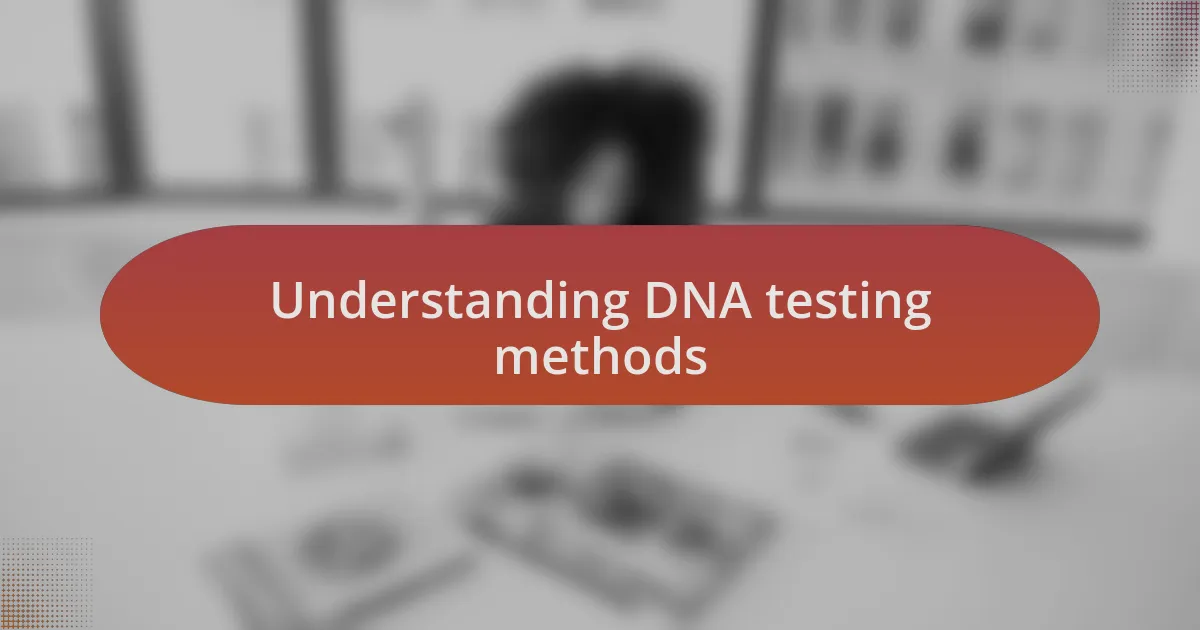
Understanding DNA testing methods
DNA testing methods typically fall into a few categories. The most common are autosomal, Y-DNA, and mtDNA tests. When I first explored these options, I was surprised at how each method serves a different purpose. For instance, autosomal testing is great for exploring your ancestral background and finding relatives, while Y-DNA focuses on direct paternal lines, which intrigued me, as I’m always curious about family lineage.
Reflecting on my experience, I remember sitting down with a Y-DNA test, eager to unravel the mysteries of my paternal ancestry. It felt like embarking on a treasure hunt. I realized that the stories within those genetic markers could connect me with relatives I had yet to discover. Have you ever wondered how a simple test could redefine your understanding of family history? The potential for revelation through just one tube of saliva or cheek swab is truly profound.
Another interesting aspect is the emotional journey that comes with testing and interpreting results. I experienced a mix of excitement and trepidation when my results arrived. They not only revealed ancestral origins but also echoed tales of struggles and triumphs from generations past. This experience made me realize that understanding DNA testing methods is not just about the science. It’s about the personal connections, the stories, and sometimes, the unexpected surprises that bring us closer to our roots.
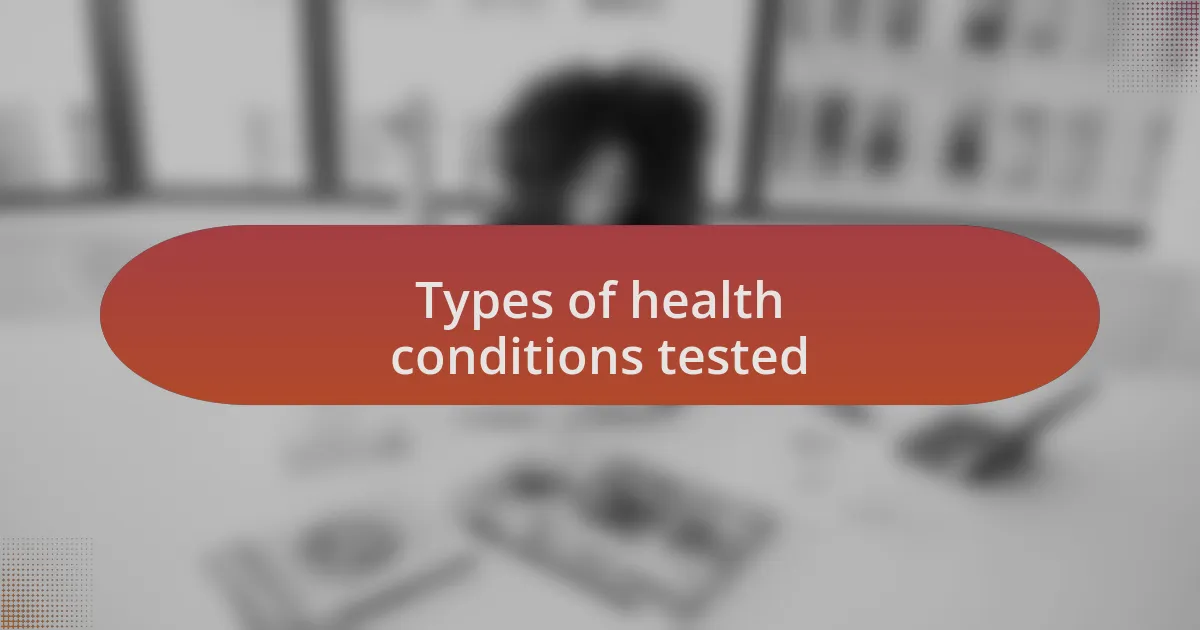
Types of health conditions tested
When it comes to health conditions, DNA testing can reveal a broad spectrum of risks and predispositions. For instance, many tests focus on genetic markers associated with conditions like heart disease, diabetes, and certain cancers. I distinctly remember how it felt to discover that I carried a gene associated with an increased risk for hereditary cancer. It was daunting, yet also empowering, as it prompted me to make proactive lifestyle changes.
Another category to consider is tests that assess carrier status for inherited disorders, such as cystic fibrosis or sickle cell disease. Learning that I could be a carrier for a condition I had never previously considered led me down a path of deeper understanding and responsibility. I found myself reflecting on how such insights could guide future family planning decisions. Have you ever thought about how your genetics could impact not just you, but the health of your loved ones?
Moreover, some tests delve into traits affecting skin conditions or even metabolic disorders. I recall my surprise upon learning about a genetic predisposition to certain allergies; it was an eye-opener that made me rethink my everyday environment and choices. This kind of knowledge can truly shape how we approach our daily lives, reinforcing the notion that our DNA holds keys to understanding not just our past, but also how we navigate our present and future health.
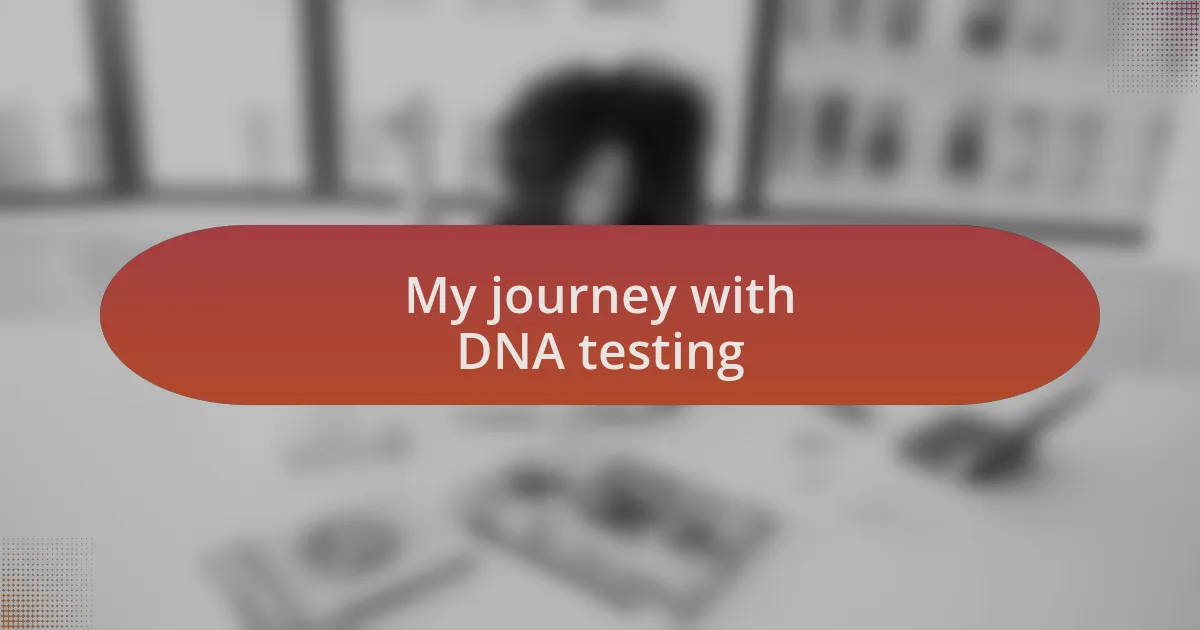
My journey with DNA testing
When I first decided to embark on my DNA testing journey, it felt like stepping into a world full of possibilities and uncertainties. I remember the mix of excitement and anxiety as I waited for my results. Each passing day heightened my curiosity, making me wonder how my genetic makeup would reflect my family history and potentially influence my health.
As the results came in, I was struck by the emotional gravity of the information. I discovered a genetic variant related to a rare metabolic condition that had affected a distant relative. This revelation prompted me to seek out more information, diving into medical literature and connecting with specialists. It was both alarming and oddly comforting to know that my experiences echoed those of someone long gone. Have you ever felt a sudden connection to your ancestry through unexpected insights? It can be quite overwhelming.
Reflecting on this experience, I realized that DNA testing isn’t just about uncovering secrets; it’s about understanding ourselves on a deeper level. The findings have significantly influenced my daily choices and priorities, encouraging me to engage in healthier behaviors. Looking back, I can confidently say that this journey shaped not just my understanding of my genetics but also my approach to life and health.
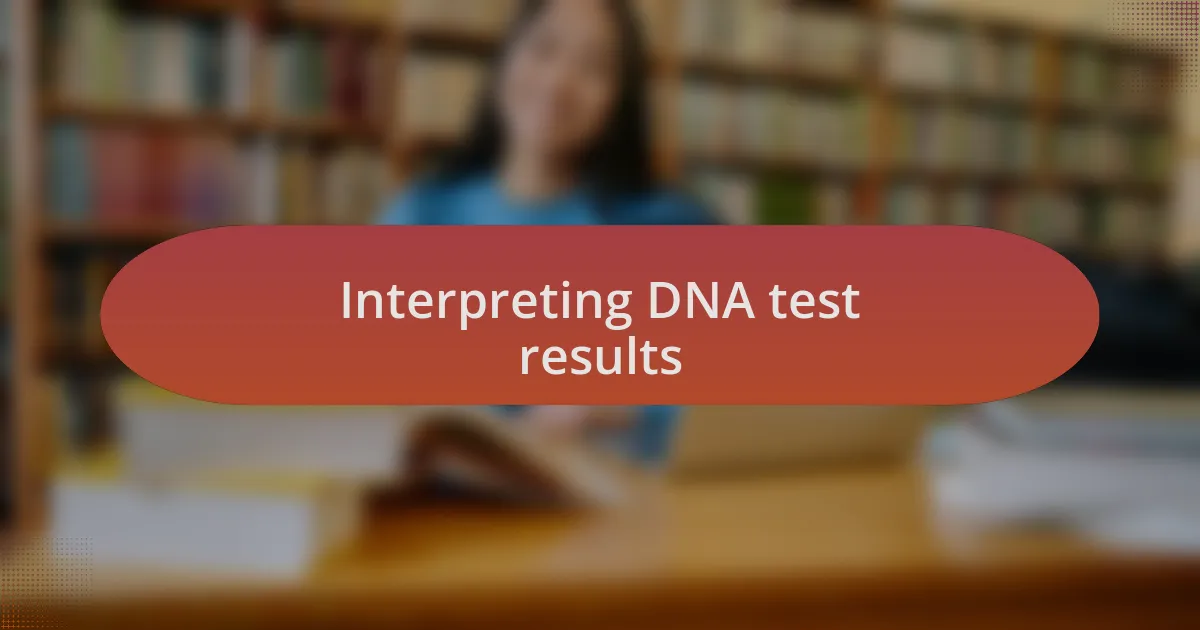
Interpreting DNA test results
Interpreting DNA test results can feel like decoding a complex language. When my results revealed that I carried a gene variant associated with heightened risk for certain diseases, I was initially overwhelmed. It made me ponder—how much of our health is truly in our hands, influenced by both genetics and lifestyle choices?
As I delved deeper into the implications of my test, I found myself looking at my family history in a new light. I remember discussing my results with my mother, who shared stories of her own health challenges. This shared understanding of our genetic background sparked a dialogue about prevention and awareness, reshaping how we approached health together. Isn’t it fascinating how a few letters and numbers can bridge generational gaps and enhance our family conversations?
Ultimately, interpreting DNA results isn’t just about reading data; it’s about weaving that information into our lives. I realized that each result came with a story, urging me to take action—not out of fear, but out of empowerment. In what ways could this knowledge reshape your life and choices? Embracing the data can truly lead to a transformative journey toward better health and understanding.
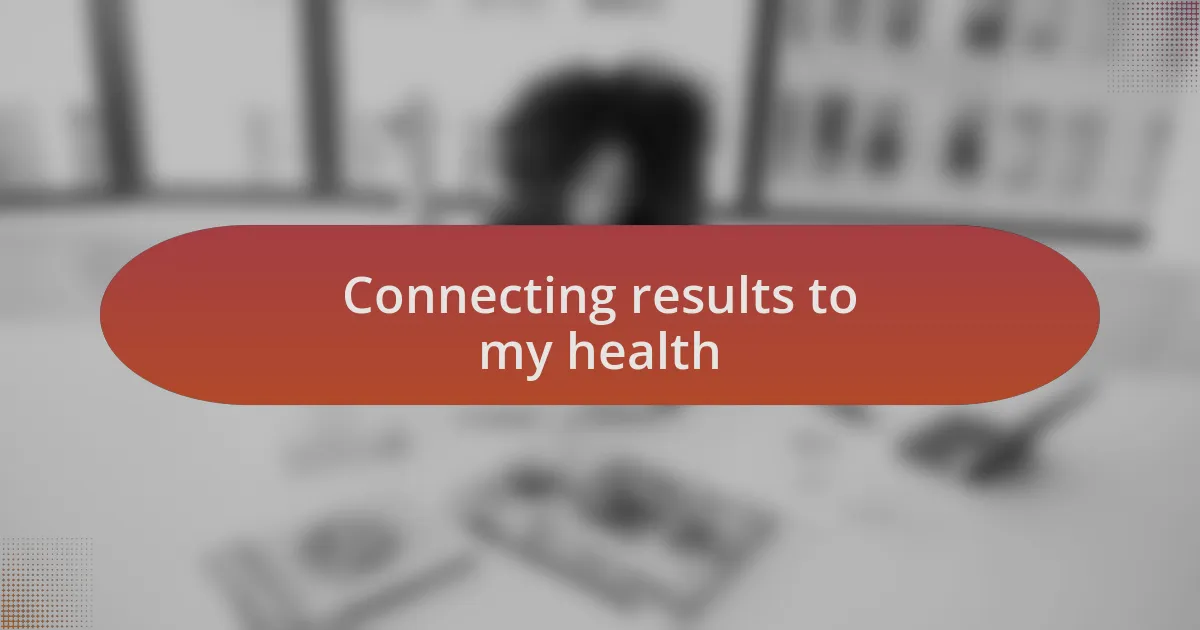
Connecting results to my health
Understanding how my DNA results connect to my health has been a revealing journey. For instance, learning that I had a predisposition to cardiovascular issues pushed me to prioritize my heart health. It was almost as if the DNA test served as a wake-up call, motivating me to embrace healthier habits that I had been neglecting.
I recall a moment when I decided to take a cooking class focused on heart-healthy meals. Standing in the kitchen, surrounded by fresh ingredients, I felt a sense of ownership over my health that was new to me. It made me wonder—how often do we miss the opportunity to take control of our well-being, simply because we don’t have the right information?
As I started connecting my results to everyday choices, I began to see the positive impacts on my overall well-being. Each small change reinforced the idea that genetics isn’t destiny; instead, it’s a guide. How can embracing this knowledge change the way you approach your own health habits? Engaging with our genetic predispositions offers a tangible path toward a proactive and informed lifestyle.

Lessons learned from my experience
One of the key lessons I learned was the importance of being proactive rather than reactive. Initially, I felt overwhelmed by the genetic risks identified in my test results. However, I realized that understanding these risks empowered me to take preventive measures instead of waiting for issues to arise. This shift in mindset made me feel more in control of my health journey. Have you ever experienced that moment of empowerment when you realized knowledge could change your life?
Another insight that struck me was the emotional connection to my heritage. Discovering certain predispositions added a layer of depth to my understanding of family health history. I found myself reaching out more to relatives, asking them questions about their health experiences. It was striking how these conversations not only increased my knowledge but also fostered a sense of connection and support within my family. Did you ever consider how such discussions could deepen your relationship with loved ones?
Finally, I learned that it’s essential to approach this journey with curiosity rather than fear. The initial anxiety I felt transformed into eagerness to explore healthier alternatives. When I discovered the risks regarding my metabolic health, instead of panicking, I sought advice and experimented with different diets that aligned with my DNA insights. This process of trial and discovery made maintaining a healthy lifestyle feel less like a chore and more like an adventure. What if embracing this journey of discovery could lead you to a healthier, more fulfilling life?